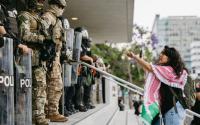Common Dreams / Published on Sunday, November 30, 2003 by the San Francisco ChronicleAnna Badkhen
Deadly bombings and suicide attacks claim lives daily, casting a pall over efforts to keep the peace. Heavily armed soldiers control little more than the ground they stand on. Anyone cooperating with the authorities becomes a target of elusive insurgents who operate swiftly, easily finding shelter among the civilian population, many of whom seem to be on the rebels' side.
Sounds like the American occupation of Iraq? It could be. But it is also the deadly quagmire Russia has been facing in Chechnya since the Kremlin's latest attempt to subdue the separatist republic began in 1999.
When the high-tech American military was blitzing its way through Iraq's vast desert into Baghdad last spring, confounding all but the most optimistic predictions, a comparison to Russia's nearly 10-year conflict in Chechnya would have seemed preposterous.
But today, with some 130,000 U.S. troops bogged down in a costly campaign against increasingly bold and sophisticated Iraqi guerrillas, the comparison does not seem so far-fetched, say analysts who have been studying Russia's campaign in Chechnya.
"It's amazing," said Sergei Markov, director of the Institute for Political Studies in Moscow. "The Americans are acting in Iraq as if Chechnya never happened, as if there are no lessons to learn."
There are differences between the battlefronts, of course. American forces in Iraq are better equipped, better trained and better paid than the Russians fighting in Chechnya; they have higher morale, nutritious food and sufficient medical care. In Russia, many soldiers -- who often serve for a meager $100 a month or less -- are "routinely denied adequate food and access to medical care," the New York-based Human Rights Watch wrote recently. Even so, American troops are no better at preserving their victories than the Russians are at theirs, said Ivan Safranchuk, director of the Moscow office of the Washington-based Center for Defense Information.
"The Chechens see the Russians and the Iraqis see the Americans as occupiers, not as liberators," Safranchuk said. "Actions against Americans will continue regardless of how Americans behave. It's difficult, but you have to learn to live with the notion that people are unhappy with your presence."
There are other striking similarities between the two conflicts. Russia announced that the war in Chechnya was over when its troops took control of the republic's major cities just a few months after the Kremlin launched the campaign in 1999. Since then, the effort to rein in Chechen rebels has become Russia's bleeding sore. Federal troops, about 80,000-strong, suffer almost daily losses at the hands of insurgents, who kill a dozen Russian servicemen each week in a war that some analysts estimate costs the country more than $2 billion a year.
Russian officials say more than 5,000 Russian soldiers have died in Chechnya since the war began, but soldiers' rights groups believe the real death toll is closer to 11,000. Russians respond to guerrilla hit-and-run attacks by combing through villages as they look for insurgents, often detaining or killing innocent Chechens and making new enemies. In May, the Kremlin said 1,132 civilians were killed in the war in 2002, but advocacy groups in Russia and in the West believe the number is many times higher.
Last month, Chechens elected a candidate hand-picked by Russian President Vladmir Putin, to govern the republic in elections that observers said were rigged. But the new president, Akhmad Kadyrov is reviled by his own people, and his administration appears to be powerless against the insurgents.
In Iraq, too, U.S.-appointed local officials say they are powerless to stop the rebels and often become guerrilla targets themselves. The Iraqi Governing Council, hand-picked by Washington, appears to have little legitimacy with the Iraqi people.
Lightly armed and highly mobile groups of guerrilla fighters -- much like the Chechen rebels -- have been mounting daily attacks against the U.S. military, killing at least 185 American soldiers since President Bush announced May 1 that the "major combat" in Iraq was over, including at least 79 in November, the deadliest month for U.S. forces since they invaded Iraq in March. According to the Pentagon's latest figures, more than 9,000 U.S. troops have been killed, wounded, or become ill enough to require evacuation since the war began.
The recently-launched "Operation Iron Hammer," aimed at cracking down harder on the guerilla movement, employs jet bombers and other heavy weaponry, like the Russians use in Chechnya, raising the possibility of more civilian casualties and even greater resentment from the Iraqi people.
"Only Americans deal with the resistance, not us. We don't have the power.
This is the problem of the Americans," said Brig. Gen. Riyad Abbas al Karbuli, police chief of Fallujah, a town 30 miles west of Baghdad that has become a flashpoint of Iraqi resistance to the occupation.
The Bush administration's plan to turn over power to a capable and democratic Iraqi government by next June may prove to be an equally hard task, say analysts.
"It seems almost certain that the leadership Iraq has on the day the U.S. transfers sovereignty will not survive for more than few years at most unless a new strongman emerges," the Center for Strategic and International Studies, a Washington-based think-tank, wrote in a report last month.
As yet , America's multibillion dollar reconstruction project has not brought the quality of life in many parts of Iraq even to prewar levels. Like many Chechens, many Iraqis are without basic services.
Incidents in which American soldiers mistakenly kill Iraqi civilians overshadow coalition reconstruction efforts. They also alienate Iraqis, some to the point of joining the guerrillas to exact revenge, thus continuing the cycle of violence.
When President Bush made his surprise visit to U.S. troops in Baghdad, he might not have been thinking about a similar trip President Putin made in 1999 to Chechnya, on New Years Eve, Russia's biggest holiday. Such morale-boosting trips may garner some temporary relief from bad news, but they ultimately don't change the underlying dynamics on the ground, say analysts who have studied both conflicts.
"Iraqis will always hate Americans, no matter what Americans do for them, " said Alexei Malashenko, an expert on Chechnya and the Middle East at the Moscow office of the Carnegie Endowment for International Peace. "To them, they will always be occupiers."
What the U.S. can avoid in Iraq is committing the kind of atrocities that have brought on international condemnation of Russian soldiers' conduct in Chechnya, Malashenko said. Human rights groups have accused the Russians of torturing, raping and murdering innocent Chechen civilians.
"Don't tease, don't torture the Muslim population," Malashenko advised. "If Americans shoot at demonstrators, if they irritate the locals, then no military equipment in the world will help them."






